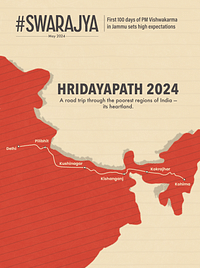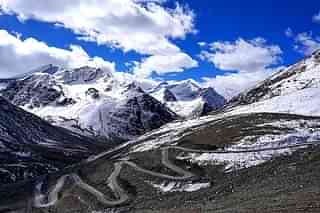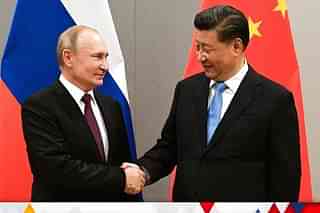Politics
What Explains The Voting Choices Of Christians, Hindus, And Muslims In Kerala?
Diksha Yadav
Mar 08, 2024, 12:37 PM | Updated 02:26 PM IST
Save & read from anywhere!
Bookmark stories for easy access on any device or the Swarajya app.

Here are the 5 key highlights from Diksha Yadav's podcast What This Means with Venu Gopal Narayanan, where he explains in detail how Christians, Hindus, and Muslims of Kerala vote. (To listen, click here for Spotify, and here for the Swarajya App).
1. What influences the Christian votes in Kerala
For the longest time, for many decades in fact, the Christian vote had been with the Congress party either directly or for the last 40-50 years in alliance with a Christian party in Kerala called the Kerala Congress and they used to do very well in the Christian majority belts of Kerala, election after election.
But in 2020, the Kerala Congress shifted allegiance from the Congress to the communists, which is what helped the left to sweep the local body polls in 2020 end and do the unthinkable, win a second mandate in the 2021 assembly elections.
From before that and through this period up to early 2023, the BJP had been making sporadic outreaches to the Christian community and there had always been certain pockets which had responded in a very nationalistic way. But it was only from early 2023 that BJP's Christian outreach increased in resonance and magnitude.
You have Prime Minister Modi meeting the bishops last year, then more recently this year around Christmas. There have been on many occasions Christian candidates standing on a BJP ticket in Kerala and in the odd cases retaining their deposits as well. This time we have Anil Anthony, A K Anthony's son, ex-Congressman, as the candidate from Pathanamtheta in the south.
In Kerala, there is a very strong symbiotic relationship between the church and its flock. I call it the economics of secularism for want of a better phrase, but there is a lot of commercial to and fro between the church and its flock by way of commerce, opportunities abroad, and benefits in education, which means that the average Christian is dependent on the church, grateful to the church for the assistance he or she gets and the normal tendency is that you don't cross the church.
Meaning that if the Kerala Congress, which is a church-backed Christian party in Kerala, is now with the communists, then you would expect that a larger chunk of the Christians in Kerala would vote for the communists.
2. Hindu votes in Kerala
The sad truth is that the Hindu community in Kerala is not unified. The majority of Hindus in Kerala belong to what is called other backward caste (OBCs). And the majority of the OBC community in Kerala which is the dominant Hindu community, are hardcore loyalists of the Communists and have been for almost a century now.
The upper caste vote Brahmins and Nairs had been with the Congress particularly during the freedom struggle and for the few decades thereafter. The Congress is by and large a Nair party for all practical purposes.
But secularism overshadowing everything else on the Congress front, the upper caste Hindus got disenchanted and from around the turn of this century started voting increasingly for the BJP.
So now you have a situation where a majority of the Hindus are voting for the left, one portion is voting for the BJP, and a small portion of that upper caste portion still votes for the Congress.
So the kind of supra caste consolidation which the BJP has managed to effect so magnificently across the country almost, it's not been able to do that in Kerala. And I'm afraid the reasons are economic and not caste or class.
Kerala operates as a remittance economy, primarily receiving money from the Gulf, and increasingly from North America and Europe. People tend to vote based on family traditions, ensuring social standing and access to influential circles, where the BJP is not prominent at any level in the state. You must know which side of your bread is buttered, so to speak.
3. Is the Modi wave and Ram Mandir less impactful in Kerala politics than the rest of India?
That's the ultimate irony because Kerala is the only state in the country where the second month of the monsoon is called Ramayana month where Hindus read the Malayalam translation of the Ramayana. It's called the Adhyatma Ramayana by Thunjath Ezhuthachan.
Even today, rich or poor, secular or otherwise they read that Adhyatma Ramayanam with great devotion and piety. Unfortunately, because of what I call the economics of secularism, the breakthrough has yet to happen.
4. What factors influence Muslim votes in Kerala, and why did the IUML request a third Lok Sabha seat - Wayanad, from the Congress?
The IUML (Indian Union Muslim League) is not a part of Congress. The Congress is a part of the IUML in Kerala. Asking for a third seat - that was part of the negotiation process. Because they (IUML) did truly believe that they deserved the third seat in Kerala.
Partly because the majority of the Christian vote had shifted to the communists. So then, who is there with the Congress? The Muslim vote. And it is still very much there, but there is a flux.
For the last two years, the communists have been assiduously wooing the Muslims, saying that 'look, your Congress party is not going to make a government in Delhi in the near future. Why don't you guys join us? Let's work together.'
And there is history because, in the 1960s, the Muslim League allied with the communists under E M S Namboodiripad. So it's not like it's never happened before. As a result, one portion of the Muslim community in Kerala now strongly believes that they are probably better off with the left because, at least then, they get a part of the power pipe.
But then who gets affected? Congress. And I am seeing that in Ernakulam, Cochin town, today. One of the major IUML leaders, a district-level leader, has been suspended from his post.
One section of the Muslim League is asking for local elections to re-elect a new member rather than an appointment. So there's a lot of flux going on. Let's see how it plays itself out over the next two months, but it's not hunky-dory except in Wayanad, where I think if Rahul Gandhi is contesting from, he should be okay.
5. What is next for the BJP in Kerala after the 2024 elections?
Malayalis are pragmatists. They're still waiting for the right reason to vote for the BJP, and it's up to the BJP to give them one or more reasons. The emotional pitch is not going to work here. It's got to be an economic pitch.
The BJP needs to come up with economic reasons why the people of Kerala should vote for them. It's got to be something centre-driven because a state unit will not be able to force it through. It will have to come from the centre, and their first test of that would have to be the local body polls, which are due at the end of next year.
That's got to be their first test. They've got to expand their cadre. In some seats like Alathur and Vadakara, the BJP has got to, if it needs to, invoke central assistance, get protection from political intimidation, and start expanding its cadres and areas. Otherwise, its growth will remain stunted.
P.S. We also go seat by seat and explain in which areas BJP can increase its vote share in 2024. Listen to 𝟮𝟬𝟮𝟰—𝗠𝗮𝗷𝗼𝗿 𝗖𝗵𝗮𝗹𝗹𝗲𝗻𝗴𝗲𝘀 𝗙𝗼𝗿 𝗕𝗝𝗣 𝗜𝗻 𝗞𝗲𝗿𝗮𝗹𝗮 podcast. Full episode here.
Save & read from anywhere!
Bookmark stories for easy access on any device or the Swarajya app.
Diksha Yadav is a senior sub editor at Swarajya.
Support Swarajya's 50 Ground Reports Project & Sponsor A Story
Every general election Swarajya does a 50 ground reports project.
Aimed only at serious readers and those who appreciate the nuances of political undercurrents, the project provides a sense of India's electoral landscape. As you know, these reports are produced after considerable investment of travel, time and effort on the ground.
This time too we've kicked off the project in style and have covered over 30 constituencies already. If you're someone who appreciates such work and have enjoyed our coverage please consider sponsoring a ground report for just Rs 2999 to Rs 19,999 - it goes a long way in helping us produce more quality reportage.
You can also back this project by becoming a subscriber for as little as Rs 999 - so do click on this links and choose a plan that suits you and back us.
Click below to contribute.





